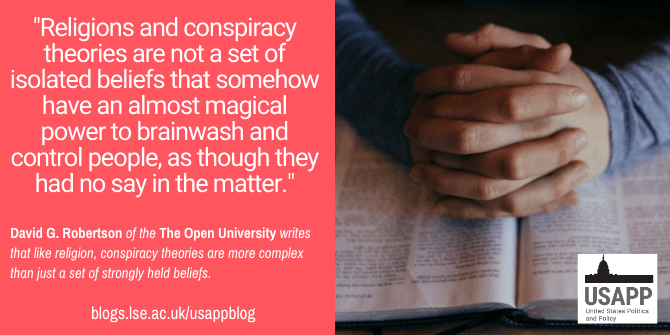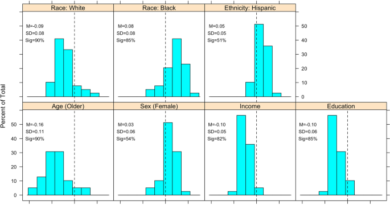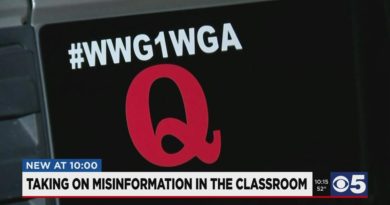Like religion, conspiracy theories are more complex than just a set of strongly held beliefs | USAPP
 Conspiracy theories are often connected to religion; the past year has seen the rise of COVID-19 vaccine conspiracy theories among evangelical groups on social media, for example. To understand the connection between religion and conspiracy theories, we need to change the way we think about religion, writes David G Robertson. The beliefs which can drive both religions and conspiracy theories, he argues, are complex, social, and fluid, informing behaviors in often unpredictable and inconsistent ways.
Conspiracy theories are often connected to religion; the past year has seen the rise of COVID-19 vaccine conspiracy theories among evangelical groups on social media, for example. To understand the connection between religion and conspiracy theories, we need to change the way we think about religion, writes David G Robertson. The beliefs which can drive both religions and conspiracy theories, he argues, are complex, social, and fluid, informing behaviors in often unpredictable and inconsistent ways.
- On 15 June 2021, LSE Religion and Global Society (RGS), together with the US Centre and Department of International Relations, hosted an LSE Public Lecture, Religious Freedom under the Biden Administration. In conjunction with that event, RGS and the US Centre’s USAPP Bloghave launched a joint series focusing on religion in American society, bringing in experts to explore the relationship different faith groups have with American society. Read other posts in this series.
The connections between religion and conspiracy theories in the US have been increasingly obvious since the election of President Trump in 2016, and even more so since the emergence of COVID-19 in early 2020. From the New Age improv of the “Q Shaman”, Jake Angeli, to op eds on “the cult of Trump”, to the Washington Post article from February this year describing a “rapid spread” of vaccine conspiracy theories among evangelical groups on social media, the two are increasingly frequently connected in popular discourse.
In fact, conspiracy theories have been connected to religion from the very beginning; the very first use of the term in print, from The Open Society and its Enemies, Vol 2, by the famous philosopher of science Karl Popper, called conspiracy theories “the secularization of religious superstition”, where God was replaced with “the Learned Elders of Zion, or the monopolists, or the capitalists” (1945 [1966], 94). Richard Hofstadter’s famous article, The Paranoid Style in American Politics, took aim at the conservative Christian pressure group The John Birch Society. During the 1990s, the Patriot Movement espoused a libertarian theocracy, culminating in the Oklahoma City bombing and the Ruby Ridge standoff.
We might also include some things which weren’t seen as conspiracy theories at the time, but in hindsight seem almost indistinguishable, such as Senator McCarthy’s rabid hunt for Communist “sleeper cells” in the corridors of US power in the 1950s, and the Satanic Panic of the 1980s and 1990s which saw millions spent on police training and court cases (like the McMartin Preschool trial) seeking cabals of paedophile satanists who never existed, based on nothing but fantastical accounts from children using coercive techniques and the testimony of Christian evangelists. This latter narrative resurfaced with Pizzagate in 2016 and then Qanon; less often noted is that it also encouraged the astonishing credence given to the whistleblower “Nick” by the Metropolitan police during Operation Midland. So, while the connection between conspiracy and religion may be particularly visible in the current situation, for a variety of reasons, it’s nothing new.
Religion and the complexity of belief
To understand why this is, however, we need to shift how we are thinking about religion, and belief. Belief is a much more complex thing than we have tended to think. For example, many of us today believe in heaven – but also in ghosts, or that we can communicate with a dead relative, even though these are quite contradictory. Officially, Catholics “believe” in transubstantiation, that the wafer literally turns into the flesh of Jesus during Communion, but in fact, less than a third actually do. Or horoscopes – if asked if we “believe in” horoscopes, most of us will say that we don’t. But asked if you read your horoscope, many more of us do (myself included). And asked if they have looked up whether their sign is compatible with their partner’s? Maybe a majority have.

Photo by Patrick Fore on Unsplash
So, beliefs are not simple propositions held inside us which drive our outward behavior in predictable ways, as is sometimes presented. As the horoscope story above suggests, the statement “I believe in” is more of an act of commitment than anything else – it expresses the importance of something to us. But in terms of how they relate to our actions, beliefs are better thought of as situational, dispositional, and socialized – more like a set of options that you have picked up over your life from friends, family, your community, the broader culture, your own reading, which provide us with avenues for action in different circumstances. Just as we might “code-switch” to a different dialect and even behaviors when visiting family, we might be prepared to try reiki when conventional treatments fail to bring relief, or an atheist might pray in the face of death. And it does seem to be the case that people can turn to both religion and to conspiracy theories at times of stress.
The importance of practice as well as belief
But religion too is much more complex than it is often presented. Our common understanding, that religion is a matter of private beliefs (indeed, we often even call religions “faiths”) is not only because we live in a Christian-majority country, but because this idea of religion was exported around the world by colonialism. But while colonized cultures were forced to adopt this idea of religion, it wasn’t always a good fit. Most of what we are usually told about Hindu beliefs in fact represents those of only a tiny priestly elite – and even the view of Hinduism as one single religion was largely a colonial invention (albeit one that was very useful in the fight for Indian independence). Jewish identity is as much about cultural and perhaps even ethnic identity as it is about beliefs – even in Israel, the world’s only Jewish state, nearly half are secular Jews. In Japan, people see no contradiction in having Buddhist funerals, Christian weddings and taking part in public Shinto ceremonies, because they see religion as predominantly something you do, rather than something you believe.
This more fluid view of religion as something lived and enacted by individuals and communities has become the norm among scholars of religion; yet religion-as-belief remains enshrined in law, and indeed is considered a fundamental aspect of the modern secular nation state. Court cases such as that of Jack Phillips, a Colorado Baker who refused to bake a cake for a same-sex wedding, members of the Church of the Flying Spaghetti Monster who want to wear colanders in their driving license photos, to a man who was fired for supporting Scottish nationalism, court cases involving religion usually revolve around the question of “sincere belief”. But while the right to hold religious beliefs is protected under law, the same is not true of conspiracy beliefs. The sincerity of Pizzagate shooter Edgar Madison Welch’s belief that there were children being imprisoned at Comet Ping Pong was not considered, and indeed may even have counted against him. If you can present your COVID-19 scepticism (or homophobia, or racism) as being driven by your religious beliefs, however, then you can be afforded protection under the First Amendment – as Jack Phillips was. And for all the attention on the harm caused by conspiracy theories (real, though exaggerated), governments and the media are less keen to direct their criticism on the harms caused by religious institutions (such as the Catholic Church’s cover-up of child abuse).
So, religions and conspiracy theories are not a set of isolated beliefs that somehow have an almost magical power to brainwash and control people, as though they had no say in the matter. They are complex, dynamic, multiple, and social – just like our own worldviews. But the traditional ways of thinking about them are deeply bedded into modern political discourse, and it will take a long time to change. Yet seeing beliefs (whether conspiratorial or religious) as something complex, fluid and deeply entangled with many different aspects of our lives, rather than a kind of computer program that unresponsively drives our behavior, we can begin to rethink how we deal with problematic behaviors. We may find new ways to legislate freedom of belief that doesn’t give authoritarian governments the right to silence dissent while empowering deeply conservative religious institutions. And just maybe, we can stop dividing the world into the Us who know, and the Others who merely believe.
Please read our comments policy before commenting
Note: This article gives the views of the authors, and not the position of USAPP– American Politics and Policy, nor of the London School of Economics.
Shortened URL for this post: https://bit.ly/3x203R3
About the author
 David G. Robertson – The Open University
David G. Robertson – The Open University
David G. Robertson is Lecturer in Religious Studies at the Open University, co-founder of the Religious Studies Project, and co-editor of the journal Implicit Religion. His work applies critical theory to the study of alternative and emerging religions, “conspiracy theory” narratives and the disciplinary history of the study of religions, with a particular interest in claims of special knowledge. He is the author of Gnosticism and the History of Religions (2021) and UFOs, the New Age and Conspiracy Theories: Millennial Conspiracism (2016), and co-editor of After World Religions: Reconstructing Religious Studies (Equinox 2016) and the Handbook of Conspiracy Theories and Contemporary Religion (Brill 2018). Twitter: @d_g_robertson
This article has been archived for your research. The original version from London School of Economics can be found here.


